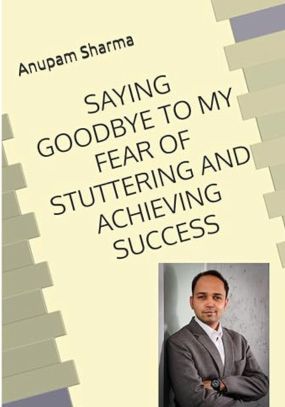This is a review of a short autobiographical text by Anupam Sharma. Born and educated in India, he now lives in Germany with his wife and daughter and works in the IT industry. Outside of his profession, he is skilled in areas such as photography and music, as well as languages — he learned German shortly after moving to his new country. Yet someone can have all the outward signs of success and still be plagued by self doubt and feelings of inadequacy. He writes that his stuttering used to cause him a great deal of devastation and hopelessness. The purpose of his book is to share with others how he became comfortable with himself and no longer feels the anxiety and fear that once negatively affected his life.
The Stress of Being Different
As a kid Sharma was able to hide his stuttering most of the time, but as he got older and more speaking demands placed on him, he experienced embarrassment and shame in moments where he had to give answers in class or introduce himself. In his profession, he was expected to attend meetings, contribute to discussions and ask and answer questions. His fear of stuttering made him feel inadequate and frustrated, even though he doesn’t mention any negative reactions on the part of his colleagues. Sharma tried to avoid stuttering by talking too fast, talking over people and generally not be in sync with others and now recognizes that his behaviour was caused by desperation and fear.
Covert vs. Overt Stuttering
It is typical of people who stutterer to grossly exaggerate disfluent episodes in their minds, and distort people’s reactions. Sharma mentions times when, as he spoke to someone — whether it was a girl he had approached, a new acquaintance or a friend — a smile would appear on their faces as he was speaking to them. This “smile” took on a host of negative meanings for him and only instilled fear and guilt, and he thought about it for years.
There is plenty of research that supports the notion that covert stutterers, or those who are able to hide their stuttering most of the time, have just as much, or in some cases more, anxiety and fear about their speech as those with a more chronic problem. They doom themselves with a perfectionist attitude, and live in fear of being “found out”, which only serves to compound their anxiety and the sense of being different from others.
Fluent People and the “Cynosure”
Idealizing fluency is another trap people who stutter can fall into. This is the belief that a perfect world of fluent speech exists on the other side of the mountain, if only we could reach it. Often when Sharma met a fluent, poised speaker he would see them as a “cynosure” — a word of Greek origin meaning “beautiful object of attention.” People who speak with such calm and confidence are so perfect, their lives must be easy! At one time he craved to be a “cynosure” himself —but part of his journey was realizing that everyone has their own strengths and weaknesses and that no one is "perfect". We must strive to achieve what is right and works for us, and avoid comparing ourselves with others.
Changing Attitudes, Beliefs
Sharma’s story is a pleasant read, yet there is nothing earth-shattering about his revelations. A highly intelligent, reflective and analytical person, he is now well aware of his earlier distortions of thinking. He practices meditation and a type of cognitive behaviour therapy, where he reflects on his own emotional reactions and makes efforts to change his mindset. The result is a positive outlook that allows him to practice living in the moment and abandon a “perfectionist” attitude. Saying Goodbye to my Fear of Stuttering and Achieving Success is a well-known story, but one worth retelling: that over time, with maturity and experience, it becomes easier to move beyond our insecurities, regulate our emotions, feel gratitude for the things we have in life, and approach each day with positivity, satisfied in the knowledge that we are true to ourselves and doing the best we can.
Lisa Wilder has been on the Board of Directors for the Canadian Stuttering Association since 2007. She lives in Toronto and works in Communications.
